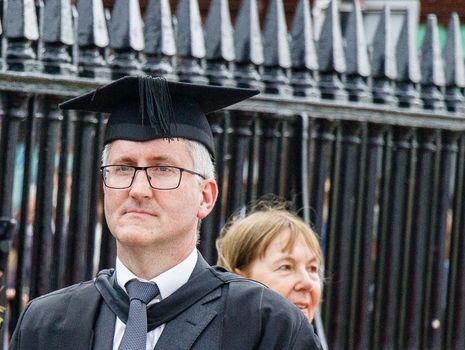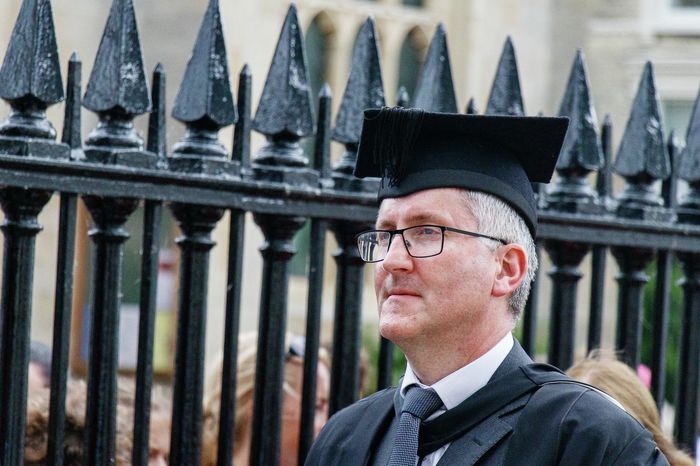Graham Virgo on Easter arrangements: The University is ‘set up to manage’ next term
Speaking to Varsity, Professor Virgo admitted that the University ‘is not in a position to enforce’ students remaining in Cambridge over the Easter vacation

Last Friday (26/02) Vice-Chancellor Stephen Toope set out how the government’s easing of the current lockdown would affect universities and how this guidance would impact Cambridge students. Following this, Varsity spoke to Pro-Vice-Chancellor Professor Graham Virgo about plans for the return of students to Cambridge, exams and Easter term.
The University hopes to welcome students for the beginning of Easter term
On Friday (26/02), Vice-Chancellor Stephen Toope announced that the University intends to “welcome back as many students as possible” for Easter term, and that they will be given a week's notice once they are permitted to return and reside in Cambridge.
Professor Virgo reiterated to Varsity that the exact date for the return of all students to Cambridge is unknown, but that the University is hoping that there will be “enough notice to bring people back for the start of term” following a government review at the end of the Easter holidays. However, he added that “we can’t guarantee” that students will be permitted to return for the start of term.
He acknowledged that “there is obviously a risk” of a spike in coronavirus cases if all students “turn up in one go”, but that the University is “set up to manage it”. There will be no university-wide policy on staggering returns. Instead, there is the possibility of colleges managing students returning over “a relatively short period of time”, similarly to the beginning of Michaelmas term.
The University’s testing programmes will be a vital factor in allowing all students to return next term. Virgo stated that the testing programmes, that is the University’s asymptomatic household testing and individual symptomatic testing, will make it “easier” to welcome students back at “about the same time”, as they can “fit into the testing regime” once in the city.
“We are thinking very carefully about what next term will look like”
He highlighted that despite having “a significant number of students in Cambridge at the moment” there are “incredibly small numbers who have been infected.” He added: “We are thinking very carefully about what next term will look like, but bearing in mind how students have looked after themselves and each other, we are set up to manage this.”
Virgo praised the fact that for weeks three to five of this term, there were no asymptomatic cases detected by the University’s testing programme. “We have real confidence in the testing regime.”
No travel exception for students to return home for Easter
In his email last Friday (26/02), Vice-Chancellor Stephen Toope set out current government guidelines relating to students residing in Cambridge: “under the current guidance, all students who are currently in Cambridge are expected to remain here over the Easter vacation, unless one of the limited exceptions apply or the rules restricting travel change.”
These “limited exceptions” include returning to Cambridge for in-person teaching, or travel for essential health and safety reasons, including for mental health, and inadequate access to study spaces or resources such as library services.
Virgo emphasised to Varsity that students who are currently in Cambridge should remain, as government policy means there is a “legal regime against travel” that would prevent students from travelling to and staying anywhere else overnight. He stressed “that applies to me, to everybody” unless travel falls under one of the above-named limited exceptions.
“There is no exception for students at the end of term to travel home”
Although the government introduced a travel window in December to allow students to travel home for Christmas, Virgo explained that currently “there is no exception for students at the end of term to travel home.”
According to Virgo, the advice published on the University’s website “is simply reiterating what the legal position is.” He admitted: “The University is not in a position to enforce that, but we are under obligation to inform students that this is the position that they’re in.”
Virgo also raised the “hope” of government guidance changing on the 29th March to allow more travel, or even the creation of “an exception for students to travel home for the Easter holidays”, but added that “we just don’t know”.
Support for resident students
Varsity questioned the Pro-Vice-Chancellor about practical aspects of students staying in Cambridge over the Easter holidays, including whether they would be expected to pay rent for the entire vacation period. Virgo stated that rent “is a college matter” but that he “understands” that “students will be expected to pay rent.”
He said that student hardships funds are available to help students in financial difficulty due to unexpected accommodation costs, and advised students concerned about the financial impact of remaining in Cambridge over the holidays to discuss their circumstances “with somebody in their college, their tutor for example.”
As well as financial support for accommodation charges, he explained that college and University services “will be applying throughout the vacation” to support students in pastoral and welfare matters.
“Possible” in-person teaching next term
As part of the government’s announcement of a roadmap out of lockdown, it was confirmed that students on “practical courses” will return for face-to-face teaching on the 8th March.
“If in-person teaching is possible, then it could occur”
Varsity asked the Pro-Vice-Chancellor whether all students would see a return to in-person teaching, should they return for the start of Easter term. “We hope we will be back in the position we were in [in] Michaelmas term” replied Virgo. He clarified that the University “would like” to see in-person teaching take place: “if in-person teaching is possible, then it could occur.”
But Virgo also drew attention to the personal choice of supervisors and academics as far as in-person teaching is concerned. He told Varsity that the University made it “absolutely clear from the start of the academic year” that it is a matter of “individual choice”, and that PhD students and University staff would not be under obligation to teach face-to-face.
He also confirmed that lectures will continue to be “online for the whole of the year” in order to conform to public health restrictions such as social distancing.
Exam period to be extended
Professor Virgo elaborated on the University’s plan to extend the examination period until the 2nd July: “at this stage, [it is] to give us flexibility, and it’s not for finalists and PGT [Postgraduate Taught Degree] students who need to graduate”. According to Virgo, exams may be completed before this date, but “we just don’t know because it takes a long time to construct the timetable”.
He explained that the University is aware that more exams will have to take place over a 24 hour period, and that significant numbers of students may be living “around the world” during the exam period, which means that the “normal timetable” will “have to be amended quite significantly to cater for extended exams”.
However, the University will “obviously try and get the exams timetabled as early as we possibly can.” Virgo acknowledged the strain that uncertainty around exams causes students, saying: “We are working very hard in very difficult circumstances to be as clear as we possibly can be.” The exam timetable will be made available to students at the beginning of Easter term at the latest, but will be released “as early as possible.”
Looking ahead to next year
Following the chaotic exam results season last year, the UK government has pledged that this year, A-Level and GCSE grades will be determined by teacher assessments. Professor Virgo informed Varsity that the University had been “prepared” for 2021 “to be a different examinations regime”.
“We’ve made offers, we’ve committed to those offers”
“We are going to proceed as normal” he said, adding that there would be none of “the uncertainty we had last year with different sets of examination results coming out.” This “uncertainty” was a result of a government U-turn following a backlash towards Ofqual’s controversial standardisation model, which downgraded 39.1% of teacher and centre-assessed A-Level grades.
When asked whether all students who had been accepted would be guaranteed a place this year, even in the case of oversubscription, the Pro-Vice-Chancellor commented: “if we are oversubscribed, we will of course guarantee the place to students” but that there is a “backstop” where the University “might need to engage with students about moving college, for example.”
Virgo insisted: “we’ve made offers, we’ve committed to those offers”. He cited the fact that for this academic year “every student who made their offer and wanted to come in 2020 was able to. We did not defer anybody.”
 News / Judge Business School advisor resigns over Epstein and Andrew links18 February 2026
News / Judge Business School advisor resigns over Epstein and Andrew links18 February 2026 News / Gov grants £36m to Cambridge supercomputer17 February 2026
News / Gov grants £36m to Cambridge supercomputer17 February 2026 News / Union speakers condemn ‘hateful’ Katie Hopkins speech14 February 2026
News / Union speakers condemn ‘hateful’ Katie Hopkins speech14 February 2026 News / CUCA members attend Reform rally in London20 February 2026
News / CUCA members attend Reform rally in London20 February 2026 News / Hundreds of Cambridge academics demand vote on fate of vet course20 February 2026
News / Hundreds of Cambridge academics demand vote on fate of vet course20 February 2026










